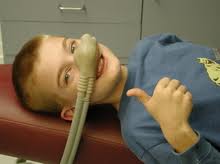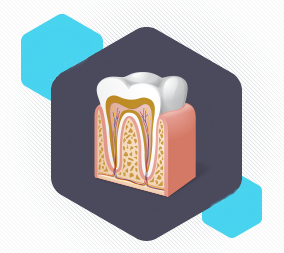Pediatric Dentistry
 A child’s first visit to the dentist should be enjoyable. Children are not born with a natural fear of the dentist, but they can fear the unknown. Our office makes a special effort to use pleasant, non-frightening, simple words to describe each treatment. We want you and your child to feel at ease from the moment your family arrives at our office. The more you and your child know about the first visit, the better you will feel.
A child’s first visit to the dentist should be enjoyable. Children are not born with a natural fear of the dentist, but they can fear the unknown. Our office makes a special effort to use pleasant, non-frightening, simple words to describe each treatment. We want you and your child to feel at ease from the moment your family arrives at our office. The more you and your child know about the first visit, the better you will feel.
Academy of Pediatric Dentistry recommends…
Children should visit the dentist by their first birthday. It is important that your child’s newly-erupted teeth (erupting at six and 12 months of age) receive proper dental care and benefit from proper oral hygiene habits right from the beginning.
Getting to know your teeth is fun!
When New Teeth Arrive
Your child’s first primary or baby teeth will begin to erupt between the ages of six and 12 months, and will continue to erupt until about age three. During this time, your child’s gums may feel tender and sore. To help alleviate this discomfort, we recommend that you soothe the gums by rubbing a clean finger or a cool, wet cloth across them. You may also choose to make use of a teething ring. When your child has finished teething, you can expect a total of 20 primary teeth.
Your child’s primary teeth are shed at various times throughout childhood. Permanent teeth begin erupting at age six, and continue until age 21. Adults have 28 permanent teeth (32, including wisdom teeth).
Adopting Healthy Oral Hygiene Habits
As your child’s teeth erupt, be sure to examine them every two weeks, looking for lines and discoloration that may be caused by decay. Remember that sugary foods and liquids can attack a new tooth, so take care that your child brushes after feeding or eating. We recommend brushing four times a day for optimal oral hygiene: after breakfast, after lunch, after dinner, and at bedtime.
Brushing can be fun, and your child should brush as soon as the first tooth arrives. When a baby’s tooth erupts, parents should brush the tooth with a soft-bristled toothbrush and a pea-sized amount of toothpaste. For children younger than two, do not use fluoride toothpaste unless advised to do so by your dentist or other healthcare professional. We suggest reviewing proper tooth brushing procedures with your child.
Flossing is also a part of good oral hygiene habits, and your doctor will discuss with you the right time to start flossing. If you notice signs of decay, contact your dentist immediately.
Preventing Tooth Decay with Regular Checkups
Tooth decay is caused by sugars left in your mouth that turn into an acid, which can break down your teeth. Children are at high risk for tooth decay for a simple reason: many children and adolescents do not practice regular, good oral hygiene habits. Proper brushing and flossing routines combined with regular dental visits help keep tooth decay away.
Your child should visit the dentist every six months for regular dental cleanings and checkups. We recommend fluoride treatments twice a year along with cleanings to keep teeth their strongest. Tooth sealants are also recommended because they “seal” the deep grooves in your child’s teeth, preventing decay from forming in these hard-to-reach areas. Sealants last for several years, but will be monitored at your child’s regular checkups.
Sedation
Nitrous Oxide:
 Some children become anxious at the dental office, and have difficulty relaxing long enough for the dentist to finish treatment. For these children, we may suggest a mild relaxant called “laughing gas” (nitrous oxide).
Some children become anxious at the dental office, and have difficulty relaxing long enough for the dentist to finish treatment. For these children, we may suggest a mild relaxant called “laughing gas” (nitrous oxide).
This is administered by placing a small mask over your child’s nose. Your child will be asked to breathe through his or her nose and not through the mouth. As the gas begins to work, the child becomes calm, although he or she is still awake and can talk with the dentist. It eases their fears so that they can relax and receive treatment comfortably and safely. When the gas is turned off, the effects of sedation wear off almost immediately.
As the child gets older and becomes more comfortable with the dentist, nitrous oxide may not be needed.
Oral Sedation:
For children who are more anxious may need an oral medication that is stronger than nitrous oxide. With oral sedation, your child may be sleepy but can be aroused if necessary and can respond to simple commands.
Before a visit in which your child is to receive oral sedation, you will receive instructions about eating and drinking, what to expect and what to watch for after treatment. You may need to carry your child home after sedation. Your dentist will also discuss how your child will be monitored while he or she is sedated.
You will need to stay for a short time after dental treatment has been completed so your child can be observed for full recovery and possible complications.

 Our goal is to provide our patients with care that lasts a lifetime,
and we are always very happy to have new patients become part of our family. Our entire team has received special training in providing comfortable, quality dental care, and we love what we do! We welcome the opportunity to provide your routine care, and we strive to treat emergencies the same day.
Our goal is to provide our patients with care that lasts a lifetime,
and we are always very happy to have new patients become part of our family. Our entire team has received special training in providing comfortable, quality dental care, and we love what we do! We welcome the opportunity to provide your routine care, and we strive to treat emergencies the same day.